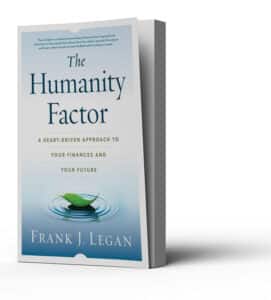Generally, when people come to us, they just want to ensure they can do two things: pay their expenses and retire. When we’re able to show them they can do more than just exist, that’s when the conversation turns. Clients will look to their partner and say, “You know, we’ve always talked about having a summer home.”
Sometimes it’s about grandkids: living closer, spending more time together, helping with their education, or a big family trip to Disney or their country of origin. Sometimes it’s just practical: “Hey, why don’t we bake in an extra thousand dollars a month in pocket money?”
A good way for your clients to start uncovering the things they’re yearning to have and do is to ask themselves:
- What would I be spending on and/or doing if money and time were not an object?
- What would I do if I weren’t nagged by the daily routine of just trying to keep up?
We like to tell our clients to think back to the eight-year-old version of themselves and ask: What would he/she be doing right now? What would that kid be spending their earnings on?
There are likely at least a few things you wanted to spend time doing as an eight-year-old that are still on your wish list. When I was eight, all I wanted to do was get on my bike, meet my buddies, and, of course, play baseball. Translated into my adult life, you can still find me spending my extra time and money watching the Cleveland Guardians (formerly Indians, still getting used to it) play at Progressive Field, or at a local park watching my nieces and nephew play.
Now, consider how your inner eight-year-old translates to your life now. Do you want more time off in the summers to go on beach trips? Do you want to be working at all? Do you want to do more philanthropy or have more time to engage with your community? Is it important to retire early so you can spend more time with your loved ones?
Sometimes the answers yield something quite grand, and sometimes it’s something really small and simple. Often, the answers will point people to the fact that they want that extra free time to spend time with those they love.
Dreams Are a Gateway to Clarity, Confidence and Success
Answering these questions helps bring extra clarity to your dreams, ambitions, and values so that you can create a plan that moves you closer to your gains instead of just living in the status quo. So many people keep their heads down, make their 401(k) contributions, and then find themselves in a position where they’re more successful than they thought they would be. You would think they’d be happy to hear that, but these folks have spent so much time and energy focused on accumulating their wealth that it can be hard for them to enjoy it.
At my advisory firm, Cedar Brook, we learn what makes our clients’ hearts go pitter-patter before we model out their unique plans. Maybe it’s purchasing another property, traveling, or setting money aside for their grandchildren’s education. When we get to this point, we run the hard numbers.
Sometimes we get to say, “You can take that trip right now.” Other times, our team gathers with a pot of coffee to create a strategy. During these brainstorming sessions, we focus on connecting our client’s resources with their possibilities. That’s why we emphasize that “your future is bigger than your past.” This is about rooting your plan in bedrock fundamentals like longevity, contentment, and purpose so you can enjoy a fuller tomorrow.
We tell clients that if they’re not looking at their plan from the lens of their values and goals, that’s corrosive conventional wisdom. “It doesn’t matter if Financial Company A or your neighbors are doing their plan differently. Who cares?” we say. “What matters is that you are the central figure in your planning and that the only thing you are just accountable for is yourself and your family.”
No Regrets
“You don’t have to think about your values and ambitions while making a financial plan, but why wouldn’t you?” we tell clients. “We don’t want you to reflect back on your life and say, ‘You know, I wish we would have taken that trip.’”
“I don’t want you to live with any regret,” I say. “Instead, I want you to maximize your hard work, family history, and relationships and make the most of what you have so you can dream even bigger.”
Sometimes in our conversations with clients, they’re skeptical of this. They think it can’t be real that they’d be able to pay their expenses, plan for the future, and still have money left over for the fun stuff. Most of the time, though, clients love these conversations. It opens their eyes to opportunities they hadn’t thought about in years.
We get why our more conservative clients get nervous about dreaming big in terms of rewards. They may have trained their minds at various points in their lives to not get overly excited at the potential of good things coming to fruition for them because they ask themselves, “What happens if those things didn’t work out?” We say, why not let the positive thoughts in? Why not allow them to flood your brain? There’s no harm in planning for the potential gains and telling yourself that you can have them.
Moving Toward Purpose
Eva’s story
We remind clients, “This is your life, it shouldn’t just be about money. It should be about the things you love.”
My client, Eva, and her husband, Ted, both work full-time. They have three children, two of whom are successfully launched, and the third is entering college. Eva and Ted are both successful; she is a sought-after consultant. Eva has many demands on her time. She’s a wife, mother, and business professional, but she’s always made it a point to volunteer with an organization she cares deeply about, one that brings her a lot of joy, Big Hearted Blooms.
The nonprofit repurposes flowers that are used in churches for various events, like weddings, funerals, or other celebrations throughout the year. Big Hearted Blooms brings these flowers to people in hospitals and nursing homes to brighten their day — particularly those who don’t have visitors and isolated, sick or scared. Eva has always loved gardening and she also loves bringing other people joy in the process. It’s a win-win and has made her fall in love with this organization.
We learned this information about Eva when asked questions like, “What does retirement look like for you?” She talked at length about wanting to spend more of her time with the organization in retirement since she loves every minute of it. We then made sure we focused her and Ted’s plan around that and put numbers behind it.
Eva knows how precious time is. She is a breast cancer survivor, so she lives with a life-changing diagnosis in the back of her mind. She goes for her regular scans and check-ups to stay on top of things in recovery, but she wants to get to the good stuff faster. She’s not someone who wants to wait to do the things she truly enjoys. We’ve seen this many times with clients. When faced with their worst fears, people start caring far less about whether Mutual Fund A will perform better than Mutual Fund B. They just want to live their life—and maximize their opportunities.
So, that became important to Eva’s plan. We helped her come up with ways she could get there faster since volunteer work was such a big passion of hers. We were able to align her resources with that priority. When it came to deciding how much to save or spend or how aggressive or conservative she should be with her money, philanthropy was her driving force.
Soren & Patricia’s story
Another couple, Soren and Patricia, are clients of ours who have lived in Cleveland forever. Their daughter, son-in-law and grandchildren live in Cincinnati, five hours from Cleveland. Like many grandparents, they want to be able to spend time with their grandchildren and want to watch them grow up. They want to be there when the kids start playing T-ball and for lots of other events in their lives.
Soren and Patricia decided to dip their toes in the water and rent an apartment, under a one-year lease, near their daughter in Cincinnati. They take two weeks at a time to go and stay at the apartment, then they head home for two weeks and stay at their house, and repeat the cycle. Being able to spend time with their grandchildren like this, they knew they wanted—and needed—more of it. It broke their hearts every time their grandchildren would say, “Why do you have to leave? Can’t you just stay, Nana and Papa?”
Not to mention, when they’re in Cincinnati, it takes a lot of pressure off their daughter and son-in-law, both of whom travel for work.
Soren and Patricia came to us, laid this all out, and told us they’re now interested in selling their house in Cleveland and buying a place to live in Cincinnati full-time. Their first question to us was, “Can we do it?” Then, they asked, “And if we can do it, what can we reasonably afford to buy?”
We were able to take this goal, match it to their numbers, and prove to them that they could absolutely make living near their grandchildren a reality. We showed them the concrete numbers to prove they could make this decision with confidence, knowing it will not negatively impact their futures. Now, they’re excited about their decision to move, and we relieved a lot of that nervousness they had when they entered our office for that conversation.
Like Soren and Patricia, I recommend to clients that they dream big and allow those dreams to be realized. Sometimes people are afraid to dream because they are afraid the answer will be “No.” But why not take a chance and find out? Even if the answer is no, there could be an alternative solution, and you might be able to experience the thing you want, only in a different way. And it will be equally as meaningful.
What money really does—just like it did for me as a kid—is offer you a resource to get what you want and pursue your purpose. For Eva, money allows her to retire sooner so she can continue bringing that joy to her community in a hobby she loves. For Soren and Patricia, money is a tool that will allow them to spend more time with the people they love.
As advisors, we can ask clients what their dreams are and encourage them to stop and really think about their answers to these questions:
- What can I begin to do now to dream big?
• If I could have or do anything, what would it be?
Encourage clients to open up their imagination, and keep it going. They’ll find happiness and confidence as they look at their own numbers and create a plan to make their wishes come true. After they achieve one of their gains, tell them to start to think about what they want their next reward to be. They’ll also find added motivation to be good with their money because they’ll be clear on why they’re saving.
And if your client is still having trouble figuring out what rewards they seek, I again encourage you to ask them, “What would your inner eight-year-old want to do? “
Then, let’s go from there!

Frank Legan is a partner and financial advisor at The Cedar Brook Group, an independent wealth management firm in Northeast Ohio. This article for Rethinking65 is based on a chapter in his book “The Humanity Factor: A Heart-Driven Approach to You Finances and Your Future” and is printed with permission. The Cedar Brook Group offers securities and advisory services through Cardaret, Grant & Co., Inc.







